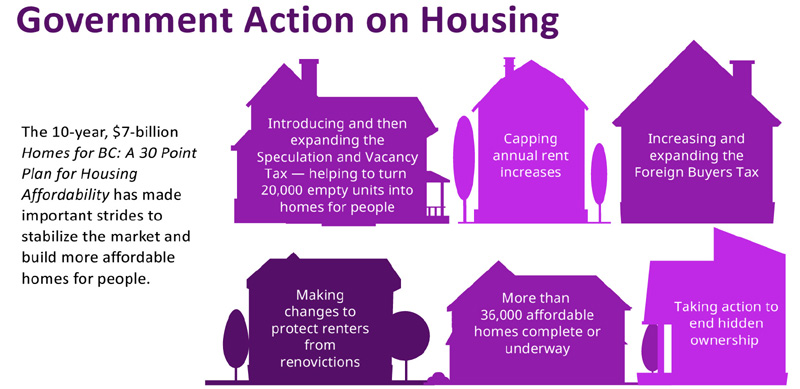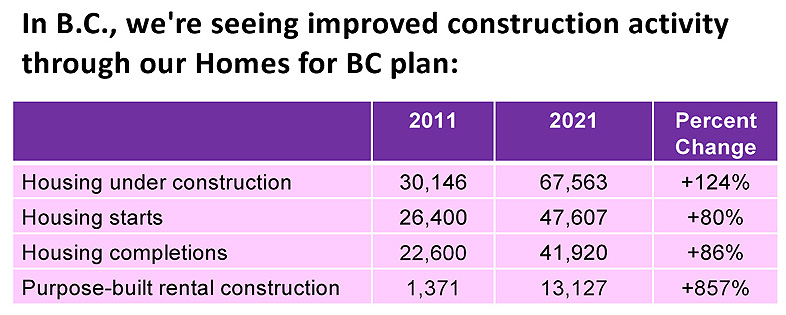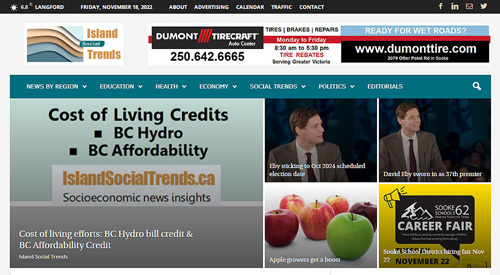Monday November 21, 2022 | VICTORIA, BC [Last updated 2:20 pm]
by Mary P Brooke | Island Social Trends
The urgency of addressing housing supply was highlighted today by Premier David Eby in an announcement about two new pieces of legislation to help address housing availability and affordability in British Columbia.
- Targets will be applied to approximately eight to 10 municipalities (to start), as determined by a review specified Housing Needs Reports, community plans, and census data, to help fast track more housing development. The Act is expected to apply to municipalities needing the most urgent action on housing supply.
- Strata councils will be directed to eliminate any age restrictions (other than 55+ for seniors) on condos, to help liberate more available rental spaces.
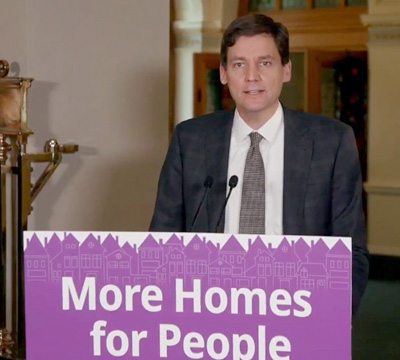
These new directions are part of the announcement today by Premier David Eby about new housing supply legislation that were introduced in the BC Legislature today. If passed, the aim is to have the legislation take place starting Spring 2023.
Housing approach for years:
Housing has been a key part of Eby’s work in government since 2017, under the Horgan government. “British Columbians will see a real priority on housing going forward under my leadership,” said Eby today, as he also welcomed input from the current housing minister Murray Rankin.
Legislation of the complexity that was presented in the legislature today “doesn’t happen overnight”, said Eby. He noted the months and year(s) of input by municipalities and agencies during his tenure as housing minister.
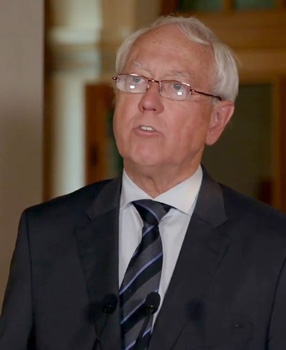
Eby said today — as when housing minister — he heard comments from parents wondering if their children will be able to find affordable homes in their own communities, from young adults expressing concern about finding accommodation to start their adult lives, and people wondering if their aging parents will find affordable places to live.
He hopes his leadership on housing will be met with cooperation from the municipalities.
Housing supply:
These next steps in attempting to manage BC’s housing crisis (by increasing supply) comes five years after the Homes for BC – 30-point Housing Plan was released (promising 114,000 new homes within 10 years). Starting in 2019, the Speculation and Vacancy Tax took effect, and rent increases were capped to inflation).
The BC Government feels that the housing market started to stabilize in 2020-2021, despite a run on home-buying during the pandemic and a starkly low rental vacancy rate at this time.
The BC Government issued figures today showing an increase in housing construction in BC over the last 10 years (2011-2021). He stated that housing construction starts are a good indicator of housing supply development.
Middle-income housing:
Today’s announcement pays nuanced attention to the middle-income housing market, where various influences are contributing to structural shifts in housing availability, including homelessness:
“It’s important to see the connection between middle-income housing and…homelessness,” said Eby today. “Middle-income people are bidding up the rents in housing,” he said, pointing out that’s how people are being displaced from basement suites as well as from those older rental buildings “into homelessness”.
Middle-income earners are key players in the economy of cities, it was pointed out. Businesses over the past several years have complained that they can’t retain workers if the workers cannot afford to live in the local vicinity.
Working with municipalities:
The Province aims to work with municipalities to set targets through a consultative approach, as outlined today.
Municipalities will need to submit a Housing Needs Report, and take action to meet targets (such as zoning approvals).
The legislation “has teeth” as Eby put it today, meaning direction can be given and compliance recommended.
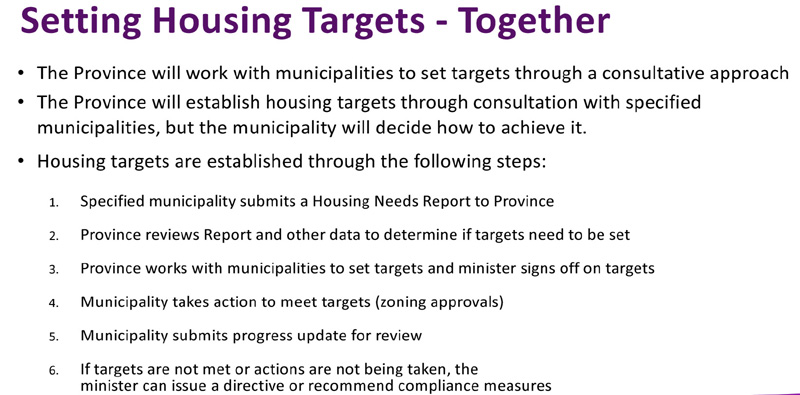
Lifting age restrictions on strata units:
A significant change in today’s announcement is the news for strata councils and the condo-unit owners governed by those councils.
Primarily there will be a lifting of age restrictions (other than in age 55+ buildings for seniors) so that people of any age can be allowed to live in strata units in BC.
Eby says this will help liberate about 3,000 units in BC that condo-owners would rent out — if they could — but need the age restrictions lifted.
Eby explained that condos built pre-2010 are still allowed to have restrictions such as no residents under the age of 19. Eby has been hearing from condo owners who’ve had to move in order to start a family, if they had been living in a condo that did not allow children.
Rental restriction bylaws have already been banned in strata corporations formed since January 1, 2010. The change extends the ban on rental restrictions to stratas formed before that date. There are approximately 300,000 strata units built before 2010 that may still be subject to rental bans.
The Province is also making life easier for those who live in stratas by making electronic meetings a permanent option (something that proved helpful to maintaining strata council attendance during the pandemic in 2020 and 2021).
Restricting short-term rentals still encouraged:
Stratas that want to restrict short-term rentals, like AirBnBs, will still be encouraged to do so to ensure long-term rental options are available for British Columbians.
Specific needs of tourism-dependent municipalities (including availability of accommodation for tourism industry workers) — such as Tofino and Whistler — will be paid attention to carefully, said Premier Eby today.
West shore emphasis in the CRD:
In the Greater Victoria area, for years the Capital Regional District’s (CRD) Regional Growth Strategy has been targeting communities in the west shore — such as the City of Langford and City of Colwood — for housing expansion in the region.
As stated by the CRD: “The Regional Growth Strategy (RGS) is a vision for the future of the capital region, guiding decisions on regional issues such as transportation, population growth and settlement patterns. The RGS promotes the long term livability of the region with policy intended to enhance social, economic and environmental performance. The current RGS was adopted in 2018 and amended with updated population projections in 2021.”
Within the new legislation (if passed and coming into effect in 2023), would see capital region municipalities evidently needing to accommodate the expectations of the Regional Growth Strategy.
Island Social Trends has sought comment from the Capital Regional District (and the City of Langford), as to how this new legislation (once passed) might impact housing development in Langford where at least two components of urban living have been impacted: in-town greenspace and school capacity.
CRD media rep Andy Orr today told Island Social Trends that the CRD would want to see the fine details and the regulations that go with it before making any detailed commentary.
Impacts on schools:
As housing for an increasing number of people is facilitated in municipalities, the public school system is challenged to also keep up with the pace of growth.
This has been seen widely in the west shore of Greater Victoria, where School District 62 (with schools in Langford, Colwood and Sooke) has been forced to prioritize and focus on facility growth since at least 2014; SD62 student capacity is still at or over stated limits in many schools.
Notably, for the 2020-2021 academic year in SD62 the normally nearly-bang-on student population estimate was off by 50 percent (as stated by one of the associate superintendents earlier this year). The shortfall in estimating the influx of new students was largely due to having no expectation of more than the ‘usual’ number of people living in smaller condo and townhouse units (as families struggle to deal with affordability to put a roof over their heads). Awareness of this socioeconomic shift is now included in SD62 population projection decision-making.
New Eby Cabinet announcement December 7:
The new Cabinet (executive council) under Premier David Eby will be announced on December 7 at Government House. There is no indication yet as to which MLAs will remain in cabinet, notably in the key files of finance, health, housing and Indigenous relations.
===== ABOUT ISLAND SOCIAL TRENDS:
Island Social Trends is a professional news portal at islandsocialtrends.ca . Fully online since mid-2020, Island Social Trends emerged from previous print publications in the west shore: MapleLine Magazine (2008-2010), Sooke Voice News (2011-2013), and West Shore Voice News (2014-2020).
Since 2008, journalist and editor Mary P Brooke has taken a socioeconomic lens to the news of the west shore and south Vancouver Island region, including BC and national news impacts.
Subscribe to the free Island Social Trends ENews or the Island Social Trends Premium portal.




